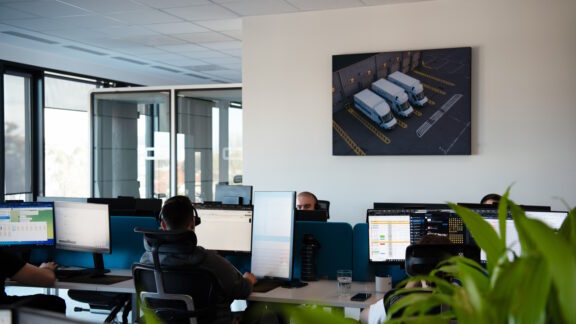The freight forwarder’s job in 2025 is dynamic, demanding, and highly rewarding. With technological advancements and globalization of the transport market, this role has become more complex. A modern freight forwarder not only organizes shipments and ensures their timeliness but also uses advanced digital systems, analyzes data, and optimizes logistics processes. So, what does the daily work of a freight forwarder in a modern transport company like MAKO TSL look like? Let’s take a closer look at this profession.
The Basics – What Does a Freight Forwarder Do Daily?
A freight forwarder is responsible for organizing the transportation of goods, both domestically and internationally. Their daily work includes receiving and executing transport orders, selecting appropriate transport means and routes, negotiating rates and terms of cooperation with carriers, and monitoring transport progress while solving any emerging problems. Additionally, they handle documentation related to freight transport and collaborate with clients, carriers, and other company departments. This requires great flexibility and the ability to make quick decisions, as the transport industry is extremely dynamic and ever-changing.
At MAKO TSL, we have restructured the responsibilities of a freight forwarder, delegating some of them to other teams. Collaboration with carriers is now managed by two teams – one for acquiring new contacts and another for maintaining ongoing partnerships. All tasks related to document flow and settlements have been assigned to the back office, a dedicated administrative unit. Thanks to these changes, freight forwarders at MAKO TSL can focus on their core responsibilities, which involve organizing the transport of goods across Europe. However, it is worth noting that many smaller transport companies cannot afford such specialized teams, leaving all these duties solely in the hands of the freight forwarder.
What Qualities and Skills Are Essential for a Career in Freight Forwarding?
To succeed in freight forwarding, it is necessary to possess specific qualities and skills, which can be categorized as “soft” and “hard.”
Among the “soft” skills, organizational ability is key, as freight forwarders often manage multiple orders simultaneously. Communication skills play a crucial role, as they are in constant contact with clients and drivers. The ability to work under pressure is also vital – the transport industry often involves unforeseen situations that require quick decision-making, especially when analyzing new orders and deciding whether to take them.
Regarding “hard” skills, fluency in foreign languages, particularly English, German, or French, is a significant advantage, in facilitating communication with international partners. Proficiency in modern IT systems is increasingly desirable, as freight forwarders use advanced Transport Management Systems (TMS) and analytical tools that support daily operations.
Changes in Freight Forwarding Over the Last 20 Years
The transport industry has undergone a significant transformation over the past two decades. Twenty years ago, most operations relied on paper documentation and phone negotiations, whereas today, digital solutions dominate. The work of a freight forwarder is now largely conducted through computer systems, which has led to the automation of logistics processes. The development of GPS technology and telematics has enabled precise cargo tracking, while the growing importance of data analytics has optimized routes and costs. The introduction of cloud systems has provided greater flexibility and data security, and the rapid evolution of digital platforms has facilitated collaboration between freight forwarders and clients.
Looking back at daily operations in MAKO TSL’s offices, large telephones and Gigaset sets have been replaced by headsets and speed-dial software. Initially handwritten notes and later spreadsheet-based schedules have ultimately given way to advanced transport management programs.
How Has Technology Impacted the Daily Work of a Freight Forwarder?
As discussed in the previous section, technology has fundamentally changed the daily work of a freight forwarder, making it more efficient and less prone to errors. Modern Transport Management Systems (TMS) allow for comprehensive logistics process management, from route planning to real-time shipment tracking. Artificial intelligence and big data analysis enable the prediction of delays, cost optimization, and better matching of carriers to orders. Thanks to telematics and IoT technology, vehicle and cargo status can be monitored in real time, providing greater transport control.
Digital platforms streamline communication between freight forwarders, clients, and carriers, reducing the time required to execute orders. Additionally, automation of documentation, including electronic invoices and digital signatures, speeds up administrative processes and minimizes the need for paper-based documentation.
Conclusion
The job of a freight forwarder in 2025 is more demanding yet significantly more efficient than it was even a decade ago. Thanks to modern technology, freight forwarders can operate faster, more effectively, and with greater efficiency. However, interpersonal skills, the ability to make quick decisions, and adaptability in a dynamic environment remain crucial.
A career in freight forwarding is an excellent path for ambitious individuals who enjoy challenges and value interpersonal connections. At MAKO TSL, we are constantly looking for such individuals – not necessarily with experience, as we offer a comprehensive training program based on our 14 years of industry expertise to prepare new employees for the profession.



